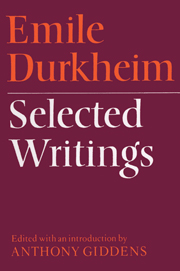Book contents
- Frontmatter
- Contents
- Preface
- Abbreviations
- Introduction: Durkheim's writings in sociology and social philosophy
- 1 The field of sociology
- 2 Methods of explanation and analysis
- 3 The science of morality
- 4 Moral obligation, duty and freedom
- 5 Forms of social solidarity
- 6 The division of labour and social differentiation
- 7 Analysis of socialist doctrines
- 8 Anomie and the moral structure of industry
- 9 Political sociology
- 10 The social bases of education
- 11 Religion and ritual
- 12 Secularisation and rationality
- 13 Sociology of knowledge
- Index
9 - Political sociology
Published online by Cambridge University Press: 05 August 2012
- Frontmatter
- Contents
- Preface
- Abbreviations
- Introduction: Durkheim's writings in sociology and social philosophy
- 1 The field of sociology
- 2 Methods of explanation and analysis
- 3 The science of morality
- 4 Moral obligation, duty and freedom
- 5 Forms of social solidarity
- 6 The division of labour and social differentiation
- 7 Analysis of socialist doctrines
- 8 Anomie and the moral structure of industry
- 9 Political sociology
- 10 The social bases of education
- 11 Religion and ritual
- 12 Secularisation and rationality
- 13 Sociology of knowledge
- Index
Summary
DEFINITION OF POLITICAL SOCIETY AND THE STATE
An essential element that enters into any notion of a ‘political’ group is the opposition between governing and governed, between authority and those subject to it. It is quite possible that in the initial stages of social development this distinction may not have existed; such an hypothesis is all the more likely since we do find societies in which the distance between the two is barely perceptible. But in any case, the societies where it is found must not be confused with those where it does not occur. The former differ from the latter in type, and require different terms of description: we should keep the word ‘political’ for the first category. For if this expression has any meaning, it implies primarily the existence of some kind of organisation, however rudimentary; it implies an established power – which may be stable or fluctuating, weak or strong – to whose action individuals are subject, whatever it may be.
But a power of this type is not found solely in political societies. The family may have a head, with powers which are sometimes absolute in character, and sometimes restrained by those of a family council. The patriarchal family of the Romans has often been compared to a state in miniature. Although, as we shall see below, this expression is not justified, we could not object to it if the only distinguishing feature of the political society were the existence of a governmental structure. So we must look for some further characteristic.
- Type
- Chapter
- Information
- Emile Durkheim: Selected Writings , pp. 189 - 202Publisher: Cambridge University PressPrint publication year: 1972

